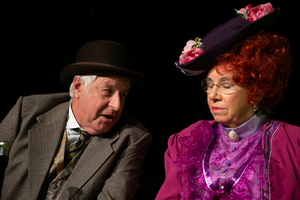 Reviewed by Eddy Knight, Friday 15th November 2019.
Reviewed by Eddy Knight, Friday 15th November 2019.
George Bernard Shaw wrote plays of ideas, their dramatic conflict based on conflicting thoughts and beliefs, rather than by physical passions or by disturbed psyches. Any action in them is solely in the realm of discussion. This could prove a problem to any company wishing to re-mount them one hundred and thirty years later in our much more visually based, fast-moving era. Independent Theatre has overcome this problem by staging
Mrs. Warren's Profession as a period costume drama.
While the central issue in this play might still disturb the consciences of a few, including some current members of our State Parliament, for the majority of us, prostitution is no longer regarded with fear and loathing. Unpleasant to live next door to perhaps but, essentially, a capitalist enterprise like any other, literally a 'service industry'.
Not so back in 1893 when Shaw wrote it to attack the prevailing hypocrisy that could denigrate and punish 'sinful' sex workers while paying their 'respectable' sisters starvation wages to work in factories using chemical processes that would disfigure, disable and kill them.
This is the crux of the play as he wrote it, although the dilemma (and there is always a dilemma in Shaw) is played out between a mother and daughter. The determined Vivie Warren has graduated and is going to work as an actuary and study law in her spare time. Vivie is played with a perfect physicality by Eloise Quinn-Valentine, her changing feelings established with a turn of her head, the folding of arms and subtle changes of posture. Towards the end, the way in which she establishes her final character as she sits and writes in her office was a true pleasure to observe. Her usually absent mother arrives expecting filial devotion in return for the expensive education she had paid for, but is sadly disappointed. It seems an irresistible force has met an immovable object. Her mother, the eponymous Mrs. Kitty Warren, is played by Pam O'Grady who is undoubtedly the star of the show, even with the book in hand, the original cast member having pulled out at the last minute, she struts and frets her two hours on the stage quite magnificently The book becomes a natural part of her character and she pulls the audience along and in to her world.
When Vivie finds that she has been living off the 'wages of sin', for this is Mrs. Warren's profession, complications arise for all and sundry. The local vicar, played by David Roach as a man caught up in the righteous crow-like tightness of his position, turns out to have known Mrs. Warren intimately in his youth. His wastrel son, Frank, is acted by Patrick Marlin and he gives a slyness and a frivolity to what is a challenging character to play. Frank had intended to marry Vivie for her money but cannot now that her mother is no longer respectable. I have to confess this was the only weakness that I saw, Shaw was a determined supporter of women's rights, as this play perfectly demonstrates, so I couldn't work out why such a strong woman as Vivie would want a weak fop who kept referring to himself as 'little boy'. I guess Shaw is attempting to illustrate his point by constructing a role-reversal, whereby Frank is depending on his good looks to have Vivie 'buy' him, but it still doesn't quite gel for me.
Sir George Crofts is played by John Oster in a larger than life fashion that is nevertheless totally believable and a delight to watch. Nice work with the walking stick too! He is such a died in the wool capitalist that he believes it possible that he could buy Vivie's affections, and when she rejects him he lets the cat out of the bag about Mrs. Warren's on-going business, in which he is an investor.
The final character, the artistic Mr. Praed, is played by John Rosen. He is the first to speak and has the unenviable task of setting the whole thing up for us, which he does with a great deal of aplomb. Again, like the other cast members, he displays a physicality perfectly suited to his role, his use of hands, body and voice shaping him as 'artistic' without ever descending into a triteness. The role of Mr. Praed, that of a true friend, is a notoriously difficult part to play, being the only character on stage who doesn't actually want anything. John Rosen gets it right.
The sparseness of the set worked really well. The move between four different locations and their indoor/outdoor dichotomy could have destroyed the momentum with prolonged changes. This is overcome brilliantly by the four differing front door setups, the lighting design by Bob Weatherly, also helping in creating the difference between indoors and garden settings. Particular mention must be made of the costumes. Independent is blessed by having a couple of very skilled dress-makers on board in Sandra Davis and Angela Doherty. A costume drama succeeds or fails on the accuracy of the costume design. Vivie's get-up as a professional woman at work in the last act was perfect, as were her mother's hats, and I was super impressed by Praed's Inverness Cape, which was so perfectly in period. Talking of costumes, there must have been some pretty nifty changes going on in the dressing rooms.
Altogether I would say that director Rob Croser deserves to have been pretty pleased with the way everything ran last night. He has created a very watchable and at times funny show, and one that demonstrates
Bernard Shaw's strengths as a playwright.
Reader Reviews
To post a comment, you must
register and
login.
 Reviewed by Eddy Knight, Friday 15th November 2019.
Reviewed by Eddy Knight, Friday 15th November 2019. Reviewed by Eddy Knight, Friday 15th November 2019.
Reviewed by Eddy Knight, Friday 15th November 2019.